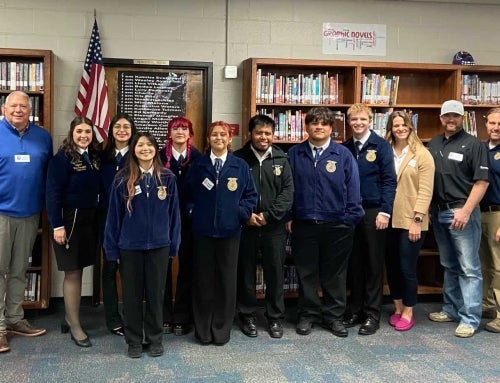Have you ever considered a career in agricultural mechanics? People who work in ag mechanics enhance farming technology and help farmers work more efficiently. They test machine systems, troubleshoot problems, perform repairs on machinery and maintain equipment to keep productivity high.
Former Oklahoma FFA advisor Jerry Renshaw spent 28 years as an ag mechanics teacher at Elgin Public Schools before starting his own truck bed and trailer manufacturing business, Built Better Enterprises LLC. During his teaching tenure from 1982 to 2010, Renshaw led the Elgin FFA mechanical team as it achieved 26 Oklahoma State University state championship titles; 13 teams went on to the national competition.
Renshaw shares six promising ag mechanics careers.
1. Agricultural Engineers
“Agricultural engineers include the person who builds a new grain drill, figures out new ways to plant or to work livestock, or works on GPS systems. Those are all engineers,” Renshaw says. “There are excellent opportunities there because right now, ag technology is climbing through the roof – not just in sciences but also in engineering and equipment.”
Electrical engineers are needed in agriculture, too.
“Now we have tractors that drive themselves,” Renshaw says. “Somebody has to wire them and put GPS systems in them.”
2. Agricultural Manufacturing Welders
“Agricultural manufacturing welders build all the products the engineers dream up,” Renshaw says. “By 2024, it’s predicted the U.S. will need 400,000 more welders. Welding is one career path, whether in the agriculture or construction industry, that’s very promising.”
3. Agriculture Equipment Dealers
Did you know some agriculture equipment dealerships provide incentives for high school graduates to attend technical school and become trained to work as mechanics/technicians for them?
“These students graduate high school, complete a one- or two-year program and then they have a job,” Renshaw says. “Within two years or less, they can earn $60,000 to $70,000 per year.”
4. Agricultural Steel Building Erectors
All the barns, dairies and other large structures used by the agriculture industry have to be constructed by skilled builders.
“New structural buildings for agricultural use also require welding, electrical wiring and plumbing, and skilled technicians are in high demand,” Renshaw says.
5. Field or On-Site Welders
Field or on-site welders are trained to use a portable welding unit so they can come to the rescue whenever equipment breaks down in the field.
“Those folks could even be self-employed,” Renshaw notes.
6. Agriculture Teacher
Renshaw knew he wanted to be an ag teacher when he was a freshman in high school.
“My own ag teacher in high school is who inspired me to become one,” he says. “I was that kid who was afraid of welding, but he showed me. Once I figured out it wouldn’t kill me, I went to town and became a very proficient welder.”
Are you interested in an ag mechanics career? Check out job opportunities at AgExplorer.com. Visit with your agriculture teacher and your school counselor to create a game plan to achieve your goal. Attend Career Development Events. Tour ag industry businesses and talk to local farmers and ranchers.
“The ag industry is evolving at a rapid pace,” Renshaw says. “While only 2 percent of the population is directly involved in agriculture, another 25 to 30 percent of the working population is in support roles such as food manufacturing, making equipment, marketing and, in the end, getting food to the kitchen table.”












